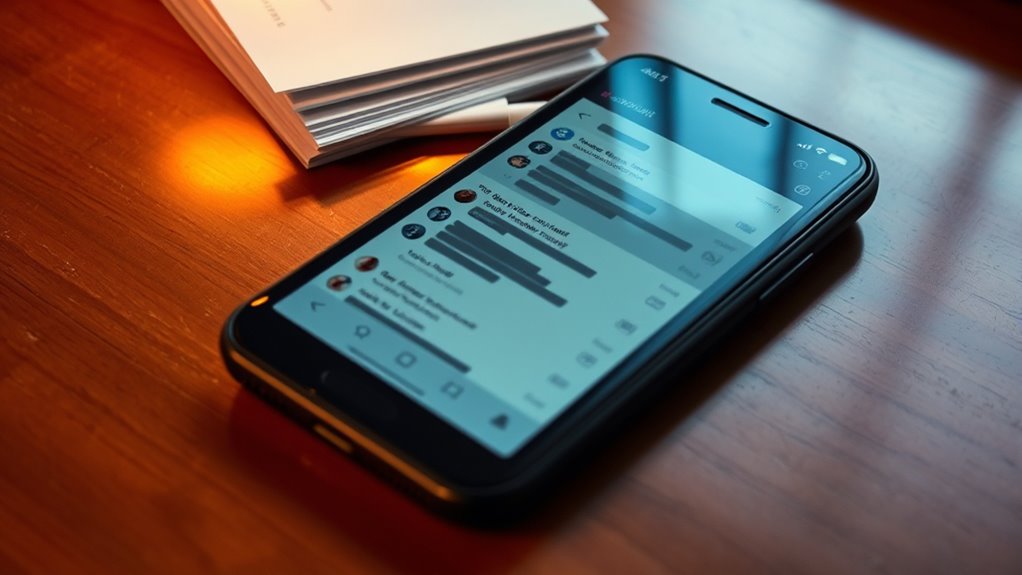Cheaters hide online using a second phone or secret accounts to keep parts of their lives separate and avoid detection. They use burner phones, hidden apps, encrypted messages, and fake profiles to conceal activities. Clearing chat histories and disabling notifications help them stay discreet. By learning about these tactics, you’ll spot signs of deception and protect yourself. Stay with us, and you’ll discover how to uncover these hidden online secrets effectively.
Key Takeaways
- Cheaters use burner phones or disposable devices to keep secret communications separate from their main phone.
- Hidden or encrypted messaging apps, renamed folders, and clearing chat histories conceal suspicious activity.
- They create fake social media profiles, use alias accounts, and log out after accessing secret accounts to avoid detection.
- Disabling notifications and employing disappearing messages help prevent obvious digital traces of cheating.
- Awareness of these tactics enables partners to recognize signs of secret online activity and protect their privacy.

Many people turn to a second phone or secret account to keep certain aspects of their lives separate, whether for privacy, work, or personal reasons. When it comes to cheating, this separation becomes even more critical. Cheaters often use these hidden tools to communicate discreetly, avoiding detection from partners or others who might stumble upon their activities. They understand that maintaining a separate digital space makes it easier to hide their tracks and continue their secret relationships without raising suspicion.
Many cheaters use secret accounts to discreetly hide their activities and maintain privacy.
A second phone or secret account acts as a digital vault, where they can store messages, call logs, photos, and even social media interactions away from prying eyes. They might use burner phones, which are inexpensive and disposable, making it easier to disappear after each use. Alternatively, some set up hidden apps or encrypted messaging services on their primary device, ensuring that even if someone gains access, their conversations remain concealed. They often rename apps or hide them in folders to make detection more difficult. This way, they preserve a clean, organized digital facade, fooling their partner into thinking everything’s normal.
Cheaters are also savvy with technology, frequently clearing chat histories, disabling notifications, and logging out of accounts after each use. They may use features like “secret chats” or “disappearing messages” to limit the chance of being caught. Some even utilize email accounts solely for their clandestine communications, further compartmentalizing their activities. The goal is to make it nearly impossible for anyone to piece together what’s really happening behind the scenes. They often rely on the assumption that if no obvious evidence is left behind, their secret can stay hidden indefinitely.
Social media platforms add another layer of complexity. Cheaters may create fake profiles or alias accounts that are untraceable to their main identity. They might also use direct messaging instead of public posts, reducing the chance of someone noticing unusual activity. Many are cautious about their online footprints, aware that even a small slip-up could reveal their secret. They might log out from their main account before using the secret one or switch devices altogether. This constant vigilance helps them maintain the illusion of transparency while secretly engaging in dishonest behavior.
Ultimately, by hiding their online activity behind a second phone or secret account, cheaters manipulate digital boundaries to preserve their deception. It’s a game of concealment, where technology becomes both their shield and their weapon. For their partners, recognizing these tactics can be the first step toward uncovering the truth and protecting their emotional well-being. Additionally, understanding the role of digital privacy tools can help in identifying suspicious activity and safeguarding personal information. Being aware of common privacy breaches can also alert individuals to potential signs of deception.
Frequently Asked Questions
How Can I Detect Hidden Online Accounts Effectively?
To detect hidden online accounts effectively, start by reviewing your device’s app and account activity regularly. Look for unfamiliar apps, messages, or login notifications. Use security tools like password managers and two-factor authentication to monitor account access. Check for unusual activity on your email and social media. You can also run security scans and consider professional help if you suspect someone is hiding accounts in plain sight.
Are There Legal Risks Involved in Monitoring Someone’S Secret Accounts?
A stitch in time saves nine, and it’s wise to know legal limits. Monitoring someone’s secret accounts can lead to serious legal risks, like invasion of privacy or breach of trust. Before you act, understand laws in your jurisdiction. You might think you’re justified, but unauthorized access could result in legal trouble. Always consider consulting a legal professional to avoid unintended consequences and stay within the bounds of the law.
What Are the Latest Tools for Uncovering Second Phones?
If you’re trying to uncover second phones, you’ll want to use the latest monitoring tools. Apps like mSpy, FlexiSPY, or Hoverwatch can help you track device activity, locate phones, and access messages. You simply install these on the target device, and they operate discreetly. Make sure you follow legal guidelines in your area before using such tools, as unauthorized tracking can lead to serious legal issues.
Can Cheaters Hide Their Secret Accounts on Encrypted Messaging Apps?
You might wonder if cheaters can hide secret accounts on encrypted messaging apps. Yes, they often do because these apps encrypt messages, making it hard for others to see their activity. They may use features like disappearing messages, hidden chats, or secondary profiles to keep their secrets safe. To uncover these, you need to look for unusual app behaviors or suspicious activity, but always approach with caution and respect privacy boundaries.
How Do Privacy Laws Affect Investigating Hidden Online Activities?
Privacy laws are like a fortress wall, protecting individuals’ personal information from unwarranted access. When investigating hidden online activities, you’re often trying to breach that wall, but these laws limit your tools and methods. They aim to safeguard privacy, making it challenging to gather evidence without proper legal procedures. So, while you seek to uncover secrets, you must respect these boundaries or face legal repercussions.
Conclusion
So, next time you’re marveling at someone’s secret phone or hidden account, remember—you’re practically living in a spy novel. Cheaters have turned online hiding into an art form, making it easier than ever to keep secrets right under your nose. Maybe it’s time to invest in a magnifying glass, or just accept that some mysteries are better left unsolved. After all, who needs honesty when you’ve got a second phone?









